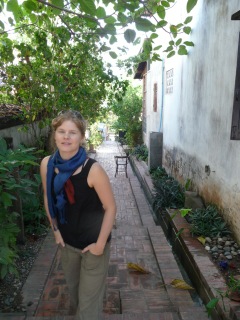Master of Nursing-Nurse Practitioner Graduate
From a small Ugandan village, to Nanaimo, BC, Caitlin Ritchie’s career has already come full circle. After graduating with a BScN in nursing from Trent University in 2007, Caitlin spent eight months in Uganda working in community health and HIV education. That experience would inform many of her future choices.
“I always planned on becoming a nurse practitioner,” says Caitlin who follows in the footsteps of her mother, a nurse practitioner in Ontario. “Nurse practitioners are excellent at providing care for the marginalized, socially complex patients that I am interested in and who are often not served well by our health care system.”
The UBCSON Master of Nursing – Nurse Practitioner Program is a full-time, two year commitment and prepares its graduates to work in primary care settings. Nurse practitioners assess, diagnose, and treat common and predictable conditions across the lifespan, and are eligible to apply for registration as Nurse Practitioner (Family) in British Columbia. “Nursing is such a flexible profession, I was able to keep working during my time off from school,” says Caitlin. Before applying, however, Caitlin knew she needed at least three years of practice. She decided to move to Vancouver to join the staff at St. Paul’s Hospital, where she developed her clinical skills through her work on the wards and in St. Paul’s ER. “St. Paul’s is known for being innovative in its service to marginalized populations.” She also worked as a primary care nurse at Bridge Refugee Clinic.
In 2013, after six years of practice, Caitlin applied for and started the MN-NP program. It was a huge change from her experience as an undergrad, where she shared classes with hundreds of others. “I really enjoyed the tight-knit group of students and the feeling of community,” she says of her class of only 13 students. “The faculty is a small group. It really feels like they get to know us individually.” The UBC program is also the only one in BC that is on site, which means classes, lab work and tutorials are all shared experiences.
“I did a course on health promotion with an emphasis on social justice,” says Caitlin. “It was my favourite because it challenged a lot of my assumptions. The course gave me the language to explain to others what the social justice role of a nurse practitioner is,” she says. “My language has changed and I can better meet people’s needs by understanding where they come from.”
For her final project, Caitlin worked with Dr. Judith Lynam to look at how to improve delivery of primary care services to the marginalized. What she learned will serve her well in her new position. This fall, Caitlin will be taking a position in Nanaimo where she will help to develop a new program for HIV and Hepatitis C patients, many of whom do not have primary care. “My job will be to try to engage people to come see me,” she says. I feel pretty excited to be given this opportunity so early in my career.” Much like her work in Uganda, she’ll be conducting needs assessments and implementing programs based on her findings. “I feel pretty excited to be given this opportunity so early in my career.



